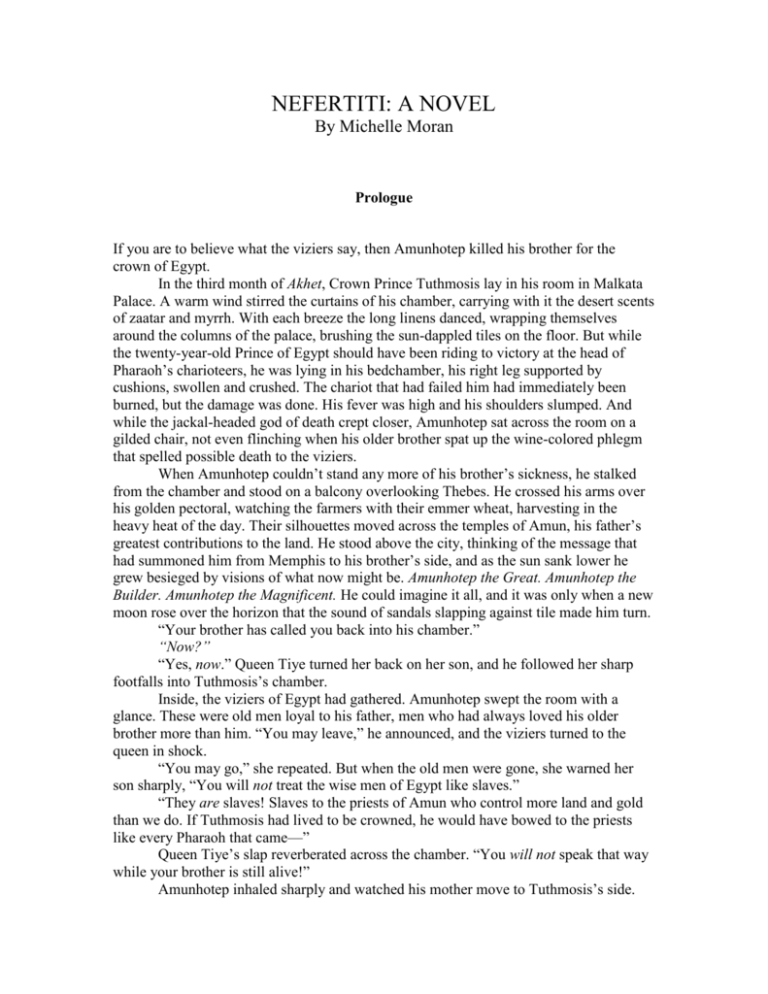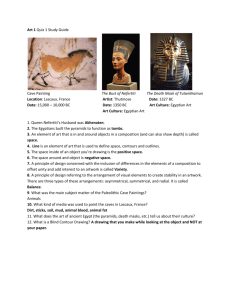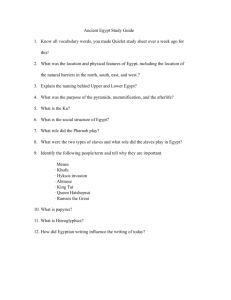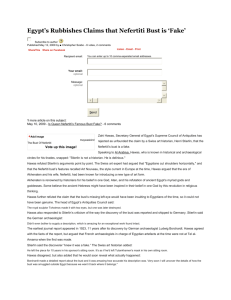Excerpt - Michelle Moran
advertisement

NEFERTITI: A NOVEL By Michelle Moran Prologue If you are to believe what the viziers say, then Amunhotep killed his brother for the crown of Egypt. In the third month of Akhet, Crown Prince Tuthmosis lay in his room in Malkata Palace. A warm wind stirred the curtains of his chamber, carrying with it the desert scents of zaatar and myrrh. With each breeze the long linens danced, wrapping themselves around the columns of the palace, brushing the sun-dappled tiles on the floor. But while the twenty-year-old Prince of Egypt should have been riding to victory at the head of Pharaoh’s charioteers, he was lying in his bedchamber, his right leg supported by cushions, swollen and crushed. The chariot that had failed him had immediately been burned, but the damage was done. His fever was high and his shoulders slumped. And while the jackal-headed god of death crept closer, Amunhotep sat across the room on a gilded chair, not even flinching when his older brother spat up the wine-colored phlegm that spelled possible death to the viziers. When Amunhotep couldn’t stand any more of his brother’s sickness, he stalked from the chamber and stood on a balcony overlooking Thebes. He crossed his arms over his golden pectoral, watching the farmers with their emmer wheat, harvesting in the heavy heat of the day. Their silhouettes moved across the temples of Amun, his father’s greatest contributions to the land. He stood above the city, thinking of the message that had summoned him from Memphis to his brother’s side, and as the sun sank lower he grew besieged by visions of what now might be. Amunhotep the Great. Amunhotep the Builder. Amunhotep the Magnificent. He could imagine it all, and it was only when a new moon rose over the horizon that the sound of sandals slapping against tile made him turn. “Your brother has called you back into his chamber.” “Now?” “Yes, now.” Queen Tiye turned her back on her son, and he followed her sharp footfalls into Tuthmosis’s chamber. Inside, the viziers of Egypt had gathered. Amunhotep swept the room with a glance. These were old men loyal to his father, men who had always loved his older brother more than him. “You may leave,” he announced, and the viziers turned to the queen in shock. “You may go,” she repeated. But when the old men were gone, she warned her son sharply, “You will not treat the wise men of Egypt like slaves.” “They are slaves! Slaves to the priests of Amun who control more land and gold than we do. If Tuthmosis had lived to be crowned, he would have bowed to the priests like every Pharaoh that came—” Queen Tiye’s slap reverberated across the chamber. “You will not speak that way while your brother is still alive!” Amunhotep inhaled sharply and watched his mother move to Tuthmosis’s side. The queen caressed the prince’s cheek with her hand. Her favorite son, the one who was courageous in battle as well as life. They were so much alike, even sharing the same auburn hair and light eyes. “Amunhotep is here to see you,” she whispered, the braids from her wig brushing his face. Tuthmosis struggled to sit and the queen moved to help him, but he waved her away. “Leave us. We will talk alone.” Tiye hesitated. “It’s fine,” Tuthmosis promised. The two princes of Egypt watched their mother go, and only Anubis, who weighs the heart of the dead against the feather of truth, knows for certain what happened after the queen left that chamber. But there are many viziers who believe that when judgment comes, Amunhotep’s heart will outweigh the feather. They think it has been made heavy with evil deeds, and that Ammit, the crocodile god, will devour it, condemning him to oblivion for eternity. Whatever the truth, that night the crown prince, Tuthmosis, died, and a new crown prince rose to take his place. CHAPTER ONE 1351 BCE Peret, the Season of Growing When the sun set over Thebes, splaying its last rays over the limestone cliffs, we walked in a long procession across the sand. In the twisting line that threaded between the hills, the viziers of Upper and Lower Egypt came first, then the priests of Amun, followed by hundreds of mourners. The sand cooled rapidly in the shadows. I could feel the grains between the toes of my sandals and when the wind blew under my thin linen robe I shivered. I stepped out of line so I could see the sarcophagus, carried on a sledge by a team of oxen so the people of Egypt would know how wealthy and great our crown prince had been. Nefertiti would be jealous she’d had to miss this. I will tell her all about it when I get home, I thought. If she is being nice to me. The bald-headed priests walked behind our family, for we were even more important than the representatives of the gods. The incense they swung from golden balls made me think of giant beetles, stinking up the air whichever way they went. When the funeral procession reached the mouth of the valley, the rattling of the sistrums stopped and the mourners went silent. On every cliff families had gathered to see the prince, and now they looked down as the High Priest of Amun performed the Opening of the Mouth, to give Tuthmosis back his senses in the Afterlife. The priest was younger than the viziers of Egypt, but even so men like my father stood back, deferring to his power when he touched a golden ankh to the mouth of the figure on the sarcophagus and announced, “The royal falcon has flown to heaven. Amunhotep the Younger is arisen in his place.” A wind echoed between the cliffs and I thought I could hear the rush of the falcon’s wings as the crown prince was freed from his body and ascended to the sky. There was a great amount of shuffling, children looking around the legs of their parents to see the new prince. I too craned my neck. “Where is he?” I whispered. “Where is Amunhotep the Younger?” “In the tomb,” my father replied. His bald head shone dully in the setting sun, and in the deepening of the shadows his face appeared hawkish. “But doesn’t he want the people to see him?” I asked. “No, senit.” His word for little girl. “Not until he’s been given what his brother was promised.” I frowned. “And what is that?” He clenched his jaw. “The co-regency,” he replied. When the ceremony was finished soldiers spread out to stop commoners from following us into the valley, and our small party was expected to walk on alone. Behind us, the team of oxen heaved, pulling their cargo across the sand. All around us cliffs rose against the darkening sky. “We will be climbing,” my father warned, and my mother paled. We were cats, she and I, frightened of places we couldn’t understand, valleys whose sleeping Pharaohs watched from secret chambers. Nefertiti would have crossed this valley without pause, a falcon in her fearlessness, just like our father. We walked to the eerie rattle of the sistrums and I watched my golden sandals reflect the dying light. As we ascended the cliffs, I stopped to look down over the land. “Don’t stop,” my father cautioned. “Keep going.” We trudged onward through the hills while the animals snorted their way up the rocks. The priests went before us now, carrying torches to light our way as we walked, then the High Priest hesitated, and I wondered if he’d lost his bearing in the night. “Untie the sarcophagus and free the oxen,” he commanded, and I saw, carved into the face of the cliff, the entrance to the tomb. Children shifted in their beads and women’s bangles clinked together as they passed each other looks. Then I saw the narrow staircase leading down into the earth and understood their fear. “I don’t like this,” my mother whispered. The priests relieved the oxen of their burden, heaving the gilded sarcophagus onto their backs. Then my father squeezed my hand to give me courage and we followed our dead prince into his chamber, out of the dying sun and into total darkness. Carefully, so as not to slip on the rocks, we descended into the slick bowels of the earth, staying close to the priests and their reed-dipped torches. Inside the tomb, the light cast shadows across the painted scenes of Tuthmosis’ twenty years in Egypt. There were women dancing, wealthy noblemen hunting, Queen Tiye serving her eldest son honeyed lotus and wine. I pressed my mother’s hand for comfort and when she said nothing I knew she was offering up silent prayers to Amun. Below us, the heavy air grew dank and the smell of the tomb became that of shifted earth. Images appeared and disappeared in the flickering torchlight, yellow painted women and laughing men, children floating lotus blossoms along the River Nile. But most fearsome was the blue faced god of the underworld, holding the crook and flail of Egypt. “Osiris,” I whispered, and no one heard. We kept walking, into the most secretive chambers of the earth, then suddenly we entered a vaulted room and I gasped. This was where all the prince’s earthly treasures were gathered; painted barges, golden chariots, sandals trimmed in leopard fur. We passed through this room to the innermost burial chamber, and my father leaned close to me and whispered meaningfully, “Remember what I told you.” Inside the empty chamber Pharaoh and his queen stood side by side. In the light of the torches it was impossible to see anything but their shadowy figures and the long sarcophagus of the departed prince. I stretched out my arms in obeisance and my aunt nodded solemnly at me, remembering my face from her infrequent visits to our family in Akhmim. my father had taken Nefertiti and me to Thebes only once. He kept us away from the palace, from the intrigues and ostentation of the court. Now, in the flickering light of the tomb, I saw that the queen hadn’t changed in the six years since I had last seen her. She was still small and pale. Her light eyes appraised me as I held out my arms and I wondered what she thought of my dark skin and unusual height. I straightened, and the High Priest of Amun opened the Book of the Dead, his voice intoning the words of dying mortals to the gods. “Let my soul come to me from wherever it is. Come for my soul, O you Guardians of the heavens. May my soul see my corpse, may it rest on my mummified body which will never be destroyed or perish…” I searched the chamber for Amunhotep the Younger. He was standing away from the sarcophagus and the canopic jars that would carry Tuthmosis’ organs to the Afterlife. He was taller than I was, handsome despite his light curling hair, and I wondered if we could expect great things from him when it was his brother who had always been meant to reign. He shifted toward a statue of the goddess Mut and I remembered that Tuthmosis had been a cat-lover in his life. With him would go his beloved Ta-Miw, wrapped inside her own miniature sarcophagus of gold. I touched my mother’s arm gently and she turned. “Did they kill her?” I whispered, and she followed my eyes to the little coffin beside the prince. My mother shook her head, and as the priests took up the sistrums she replied, “They said she stopped eating once the crown prince died.” The High Priest began chanting the Song to the Soul, a lament to Osiris and the jackal god, Anubis. Then he snapped shut the Book of the Dead and announced, “The blessing of the organs.” Queen Tiye stepped forward. She knelt in the dirt, kissing each of the canopic jars in turn. Then Pharaoh did the same, and I saw him turn sharply, searching for his younger son. “Come,” he commanded. But his youngest son didn’t move. “Come!” he shouted. His voice was magnified a hundred times in the chamber. No one breathed. I looked at my father and he shook his head sternly. “Why should I bow to him in obeisance,” Amunhotep asked. “He would have handed Egypt over to the Amun priests like every king that came before him!” I gasped, and for a moment I thought the Elder would move across the burial chamber and kill him. But Amunhotep was his only surviving son, the only legitimate heir to Egypt’s throne, and like every seventeen year-old crown prince in our history, the people would expect to see him enthroned as co-ruler with his father. The Elder would be Pharaoh of Lower Egypt and Thebes, and Amunhotep co-regent of Upper Egypt from Memphis. If this son also died, the Elder’s line would be finished. The queen walked swiftly to where her youngest son stood. “You will bless your brother’s organs,” she commanded. “Why?” “Because he is a Prince of Egypt!” “And so am I!” Queen Tiye’s eyes narrowed. “Your brother served this kingdom by joining Egypt’s army. He was a High Priest of Amun, dedicated to the gods.” Amunhotep laughed sharply. “So you loved him better because he could butcher what he blessed?” He moved quickly, stooping rashly before Pharaoh. “I will become a warrior like my brother,” he swore. The hem of his white cloak trailed in the dirt and the viziers shook their heads. “Together, you and I can raise Aten above Amun,” he promised. “We can rule the way your father once envisioned.” Pharaoh rose and held onto his walking stick as if it could support his ebbing life. “It was a mistake to raise you in Memphis,” he whispered. “You should have been raised with your brother. Here. In Thebes.” Amunhotep stood swiftly and his shoulders straightened. “You only have me, father.” He offered his hand to the old man who had conquered a dozen lands. “Take it. I may not be a warrior, but I will build a kingdom that will stand for eternity.” When it was clear that Pharaoh would not take Amunhotep’s hand, my father moved forward, saving the prince from embarrassment. “Let your brother be buried,” he suggested quietly. The look Amunhotep gave his father would have turned Anubis cold. It was only when we returned on barges across the Nile, with the waves to drown our voices, that anyone dared to speak. “He is unstable,” my father pronounced on our way back to Akhmim. “For three generations our family has given women to the Pharaohs of Egypt. But I will not give one of my daughters to that man.” I wrapped my wool cloak around my shoulders. It wasn’t me he was talking about. It was my sister, Nefertiti. “If Amunhotep is to be made co-regent with his father, he will need a Chief Wife,” my mother said. “It will be Nefertiti or Kiya. And if it is Kiya…” She left the words unspoken, but we all knew what she had meant to say. If it was Kiya, then the Vizier Panahesi would have sway in Egypt. It would be easy and logical to make his daughter queen: Kiya was already married to Amunhotep and nearly three months pregnant with his child. But if she became Chief Wife our family would bow to Panahesi’s, and that would be an unthinkable thing. My father shifted his weight on his cushion, brooding while the servants rowed north. “Nefertiti has been told she will be a royal wife,” my mother added. “You told her that.” “When Tuthmosis was alive! When there was stability and it looked as if Egypt would be ruled by…” my father closed his eyes. I watched as the moon rose over the barge, and when enough time had passed, I thought it safe to ask, “Father, what is Aten?” He opened his eyes. “The sun,” he replied, staring at my mother. There were thoughts passing between them, but no words. “But Amun-Ra is god of the sun.” “And Aten is the sun itself,” he said. I didn’t understand. “But why would Amunhotep want to build temples to a sungod that no one has heard of?” “Because if he builds temples to Aten there will be no need for the Priests of Amun.” I was shocked. “He wants to be rid of them?” “Yes.” my father nodded. “And go against all the laws of Ma’at.” I sucked in my breath. No one went against the goddess of truth. “But why?” “Because the crown prince is weak,” my father explained. “Because he is weak and shallow, and you should learn to recognize men who are afraid of others with power, Mutnodjmet.” My mother threw a sharp glance at him. It was treason, what my father just said, but there was no one to hear it above the splash of the oars. Nefertiti was waiting for us. She was recovering from fever, but even so she was sitting in the garden, reclining by the lotus pool, the moonlight reflecting off her slender arms. She stood up as soon as she saw us and I had felt a sort of triumph that I had seen the prince’s funeral and she’d been too sick to go. Guilt swept this feeling away, however, when I saw the longing in her face. “Well, how was it?” I’d planned on having the information drawn out of me, but I couldn’t be cruel the way she could be. “Absolutely magnificent,” I gushed. “And the sarcophagus—” “What are you doing out of bed?” my mother scolded. She was not Nefertiti’s mother. She was only mine. Nefertiti’s mother had died when her daughter was two; she’d been a princess from Mitanni and my father’s first wife. She was the one who gave Nefertiti her name, meaning The Beautiful One Has Come. And though we are related, there is no comparing us: Nefertiti is small and bronze, with black hair, dark eyes and cheekbones you could cup in the palm of your hand, whereas I am dark, with a narrow face that will never be picked out of a crowd. At birth, my mother didn’t name me for beauty. She called me Mutnodjmet, meaning Sweet Child of Goddess Mut. “Nefertiti should be in bed,” my father said. “She’s not feeling well.” And although it was my sister he should have been reprimanding, it was me he spoke to. “I’ll be fine,” Nefertiti promised. “See, I’m better already.” She smiled for him, and I turned to see my father’s reaction. Like always, he had a soft look for her. “Nevertheless,” my mother cut in, “you were hot with fever and you will go back to bed.” We let ourselves be herded inside, and when we lay on reed mats, Nefertiti rolled over, her profile sharp in the light of the moon. Her elbow was propped up and her head was resting on her palm. “So, what was it like?” “Frightening,” I admitted. “The tomb was huge. And dark.” “And the people? How many people were there?” “Oh, hundreds. Maybe even thousands.” She sighed. She had missed a chance to be seen. “And the new crown prince?” I hesitated. “He—” She sat up on her pallet, nodding for me to go on. “He is strange,” I whispered. In the moonlight, Nefertiti’s dark eyes glittered. “How do you mean?” “He is obsessed with Aten.” “With what?” “With an image of sun,” I explained. “But how can you honor an image of the sun and not Amun-Ra, who controls it?” She was quiet. “That’s it?” “He’s also tall.” “He can’t be any taller than you.” I ignored her criticism. “He’s much taller. Two heads over father.” “This should be interesting then,” she replied. “What should?” “Marriage,” she said lightly, lying back down and pulling the linen cover over her chest. “With a coronation so close Amunhotep will need to pick a Chief Wife, and why not me?” Why not her? She was beautiful, educated, the daughter of a Mitanni princess. I felt a sharp stab of jealousy, but also fear. I had never known a time without Nefertiti. “Of course, you’ll come with me,” she said, yawning. “Until you’re old enough to be married you’ll be my chief lady.” “Mother wouldn’t allow me to go to the palace alone.” “You wouldn’t be alone. She’d come too.” “To the palace?” I exclaimed. “Mutny, when you’re Chief Wife your family comes with you. Our father is the greatest vizier in the land. Our aunt is the queen. Who would dare to say no?” In the middle of the night a long shadow lingered outside our room, then a servant entered, holding an oil lamp above Nefertiti’s head. I awoke at the brightness and saw my sister’s face in the golden light, perfect even in her sleep. “My lady?” our servant called, but Nefertiti didn’t stir. “My lady?” she said louder. She looked at me and I shook Nefertiti awake. “My lady, the vizier Ay would like to speak with you.” I sat up quickly. “Is something wrong?” Nefertiti didn’t say a word. She stepped into her robe, taking an oil lamp down from the wall and sheltering the sputtering flame with her hand. “What’s happening?” I asked, but she didn’t reply. The door simply whispered shut in her wake. I waited up for my sister’s return, and by the time she came back the moon was a yellow disc high in the sky. “Where were you?” I scrambled up on my pallet. “Father wanted to speak with me.” “Alone?” I challenged her. “And at night?” “When else are all the nosey servants asleep?” Then I knew at once. “He doesn’t want you to marry Amunhotep,” I said. Nefertiti’s rolled her shoulders, playing coy. “I’m not afraid of Kiya.” “It’s the Vizier Panahesi he’s concerned about.” “I want to be Chief Wife, Mutnodjmet. I want to be Queen of Egypt the way my grandmother was Queen of Mitanni.” She sat down on her pallet and we were silent, illuminated only by the flame of the lamp she’d brought in. “And what did father say?” She shrugged again. “Did he tell you what happened in the tombs?” “So he refused to kiss the jars,” she dismissed. “What does that matter if in the end I’m sitting on the Horus throne? Amunhotep is going to be the Pharaoh of Egypt,” she added, as if this settled the matter. “And father has already said yes.” “He said yes?” I threw off my linen cover. “But he couldn’t have said yes. He said the prince was unstable. He swore he would never give a daughter to that man!” “And he changed his mind.” In the flickering candlelight I saw her lay down and draw up the covers. “Will you find me some juice in the kitchens?” she asked. “It’s night,” I retorted, my voice tight with disapproval. “But I’m sick,” she reminded. “I have fever.” I hesitated. “Please, Mutny. Please.” I would go, but only because she had fever.








